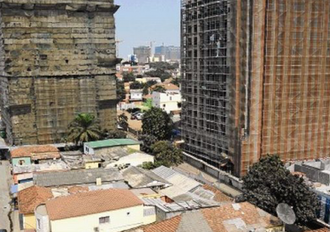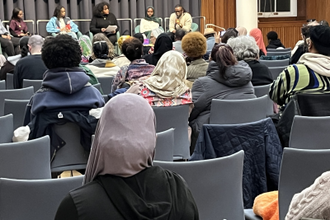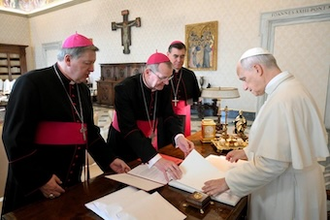Blame African leaders for continent's growing deficit with China

Half-built skyscrapers overshadow Luanda slum
Guns, Debt and the Toll Booth to Nowhere
An Angolan newspaper recently startled its readers by reporting that every Angolan citizen owes China $745 (1). Meanwhile, dozens of skyscrapers built with Chinese loans by Chinese companies in Angola stand empty (2). As the IMF warns that Africa is sliding into debt once more, partly due to vanity projects, an impending economic slump will likely trigger further and greater waves of migration (3).
The many Christians who participated in the successful Jubilee/Drop the Debt Campaigns may be alarmed to learn that some of Africa's less reliable leaders have borrowed their way back into the same perilous position their countries face in the 1980s. This time, however, it is China, not Western banks, providing the loans. Third world debt: here we go again.
A Boston University study estimates that between 2000 and 2015, China lent $95.5 billion to Africa (4). Typically, Chinese loans are offered on the basis of the so-called Angola Model: China gives a low-interest loan to a country with a combination of desirable commodities, weak governance and high levels of corruption. In Angola's case, the collateral is the oil and minerals it agrees to sell to China at certain prices. However, those prices may fluctuate, leaving Angola vulnerable. In exchange, as many as 70% of contracts will go to approved Chinese construction companies (5). There is no competitive tendering or environmental impact assessment requirement to slow down the pace of development.
China's projects in African provide employment for the estimated one million Chinese working there at any time (6). Its traders have opened up a vast market for Chinese goods, from onions to toothpicks, as the Kenyan Standard newspaper remarks caustically (7). In addition, China forms strong diplomatic bonds with African nations that can be counted on at the UN when questions of contested sovereignty arise (Taiwan, Hong Kong, Tibet, the South China Sea islands) (8).
Defending this model, Shao Zeng, from the Chinese embassy in London, speaks enthusiastically about China's strategy for Africa, the new economic zones it will create alongside infrastructure projects, and its partnerships with the African people (9). But at no point have the African people, as opposed to the well-padded, kleptomaniac elite, had any say about these plans. Anyone who has worked in Africa knows that unless there is local ownership - when Africans see how a foreign project will benefit them personally - projects will probably be unsustainable.
Noel Mbala, a former transport minister from the DR Congo, says that in his experience, African leaders don't even bother to read the contracts they sign with China. They lack the skills to negotiate, or the technical know-how to monitor projects; nor do they care, while a percentage goes into their pockets and those of their cronies (10).
Angola's leaders borrowed $3.5 billion to build a new city, Kilamba Klaxi, with homes for a quarter of a million people. At the last count, there were only 80,000 residents (11).
Across the continent, in Kenya, a $3.2 billion loan paid Chinese companies to build a new cargo rail line from Mombasa to Nairobi. The Economist magazine concluded the line is unlikely to ever carry even half the goods needed to break even. Moreover, the British colonial-era line could have been refurbished for a quarter of the cost. However, that would have defeated the purpose, which was to provide contracts for Chinese companies and well-connected local subcontractors, and a windfall for ruling elite Kenyans who quietly bought land in advance of the announcement of the route (12).
Millions have been spent on similar prestige projects across Africa, such as shiny conference facilities that stand empty most of the year. Particularly sad is an elaborate toll booth plaza in Sierra Leone, on the road from Freetown to Port Loko. A few yards beyond the toll booths, the paved road runs out, becoming a dirt path (13). The project is so controversial, it became an issue in Sierra Leone's recent election. Meanwhile, the country's health system is in such poor shape, it is unlikely to cope if Ebola appears once more (14).
There is also a "gendered" element to Africa's debt. Projects like football stadia appeal to male leaders and their male voters. Women might prefer money to be spent on supplying running water to their town, where they currently walk miles to wells.
China says its policy is one of non-interference, seeking stability (15). However, alongside the loans are contracts to supply weapons such as spiked batons to countries with poor human rights records (16). For instance, despite a UN arms embargo on Darfur, China sells the Khartoum regime the weapons it deploys to kill and ethnically cleanse its non-Arab and non-Muslim minorities (17). China claims it does not intend its helicopter gunships or high explosive incendiary cartridges to be used in Darfur, but where else does it imagine they will end up, since Sudan is not at war with any foreign powers? Using Chinese logic, America could claim its policy of supplying Israel with weapons is also non-interference.
Chinese officials have reportedly schooled officials in Zimbabwe and Angola in how to maintain power in a one-party state (18). If China's foreign policy truly aims to promote stability, why does it allow its weapons to find their way to Somali pirates and rebels trying to overthrow the fragile government of the Central African Republic? (19) China now boasts of its involvement in UN peacekeeping missions (20). Yet, it sends its soldiers into conflicts it inadvertently helped create.
Nor can China claim it is not interfering while its diplomats scheme behind the scenes at the UN to make sure motions criticising its clients, like Sudan, are never tabled. Moreover, its UN delegation has been accused of trying to diminish the power and resources of UN arms inspectors (21).
However, the blame for Africa's escalating debt, questionable projects and low revenues from mining deals does not rest solely on the Chinese. Many Africans believe American, UK and EU aid is as much tied to national interest as China's behaviour helps the Chinese. The U.K. and EU increasingly focus aid on fostering stability, which means stopping migration and curbing Islamic radicalism. In addition, for decades the West has propped up dictators and dumped agricultural surpluses on African markets, while heavily subsidizing its own farms. It has also shrunk the budgets of its moral flagships, such as scholarships for Africans (while China has vastly expanded them) (22); the Voice of America, the BBC World Service, and the British Council (23).
Blame must also attach to African governments that choose not to demand better terms when they sign contracts with the Chinese. African leaders hail from a highly privileged elite, educated at Western universities. They could stipulate that their nation will pay a little more interest on Chinese loans in exchange for a commitment that a certain percentage of workers or managerial staff must be locals whom the Chinese should train sufficiently to add to their capacity to do the job.
African campaigners, intellectuals and citizens highlight the need for systems of governance based on accountability and transparency. Hence the IMF persistently urges African leaders to tax their citizens (24).
"It is no use demonising the Chinese for making lop-sided deals," says Lord Alton of Liverpool. "The West could work with the Chinese to create a global protocol to regulate the way in which loans and contracts in the development world are structured and implemented. China would still triumph over its Western competition in Africa because it is more risk averse, takes a longer-term view of investment, and has a strategic global vision, as represented by the One Belt One Road initiative."(25)
In the meantime, Africa edges closer to a debt crisis, and entrepreneurial, pro-active citizens may vote with their feet, heading for greater opportunity in Europe, North America and Australia.
1) www.investmentwatchblog.com/heres-how-china-dumps-massive-amounts-of-u-s-dollars-without-selling-a-single-u-s-treasury/
2) www.africaresearchinstitute.org/blog/views-of-suburban-luanda-banishing-the-ghosts-from-kilamba/
3) https://qz.com/1159245/imfs-christine-lagarde-says-africas-debt-burden-could-get-worse-if-us-dollar-and-euro-strengthens/
4) www.washingtonpost.com/news/theworldpost/wp/2018/04/12/china-africa/?utm_term=.1bb726730288
5) Jamil, Anderlini, "China Insists on 'Tied Aid' to Africa," Financial Times, June 25, 2007
6) www.saisperspectives.com/2016issue/2016/5/12/n947s9csa0ik6kmkm0bzb0hy584sfo
7) www.standardmedia.co.ke/business/article/2001279371/poor-strategy-dug-kenya-into-chinese-trade-hole
8) www.brookings.edu/opinions/chinas-aid-to-africa-monster-or-messiah/
9) Shao Zeng, remarks, May 21st 2018, LIGB event, National Liberal Club, London
10) Noel Mbala, remarks, May 21st 2018, LIGB event, National Liberal Club, London
11) www.africaresearchinstitute.org/blog/views-of-suburban-luanda-banishing-the-ghosts-from-kilamba/
12) www.economist.com/middle-east-and-africa/2018/03/22/did-kenya-get-a-loan-to-build-a-railway-or-vice-versa
13) Conversation with the author, May 7th 2018, with Sierra Leone official requesting anonymity
14) Ibid
15) Shao Zeng, remarks, May 21st 2018, LIGB event, National Liberal Club, London
16) www.amnesty.ie/chinas-booming-torture-trade-revealed/
17) www.theguardian.com/world/2010/oct/21/china-darfur-weapons-report
18) www.chathamhouse.org/expert/comment/how-influential-china-zimbabwe ; www.worldaffairsjournal.org/article/new-imperialism-china-angola
19) https://sustainablesecurity.org/2017/04/19/chinas-arms-sales-in-africa/
20) Shao Zeng, remarks, May 21st 2018, LIGB event, National Liberal Club, London
21) www.theguardian.com/world/2010/oct/21/china-darfur-weapons-report; https://addisstandard.com/chinas-non-interference-policy-and-rising-african-concerns/
22) www.theguardian.com/world/2013/jul/31/china-africa-students-scholarship-programme
23) www.theguardian.com/media/2015/jan/28/bbc-world-service-cuts-uk-global-soft-power
24) www.imf.org/en/News/Articles/2015/09/28/04/53/sp022216
email from Lord Alton 30/7/18


















